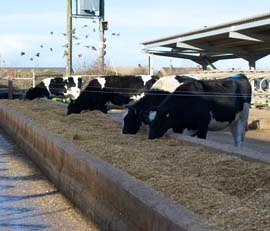Diet change on-farm could cut climate emissions

Changing cow and sheep diets could reduce greenhouse gas emissions, according to research funded by DEFRA.
The study, devised to help farm businesses cut emissions, showed that feeding animals maize silage, naked oats and higher-sugar grasses reduced the methane output.
Agriculture contributes about 9% of all UK greenhouse gas emissions and half of this comes from sheep, cows and goats.
Recent figures showed that farming accounted for 41% of the UK’s overall methane emissions.
The research, carried out by Reading University and the Institute of Biological, Environmental and Rural Sciences (IBERS), showed that increasing the proportion of maize silage from 25 to 75% in a short-term trial reduced methane emission by 6% a kilogram of milk.
It also revealed that feeding high-sugar grasses could reduce an animal’s methane emissions by 20% for every kilogram of weight gain and that naked oats could reduce methane emissions from sheep by a third.
Crushed rapeseed reduced methane production from dairy cows by 20% a litre of milk produced, the trial concluded.
In the longer term the benefits gained by changing animals’ diets will need to be considered against other environmental impacts, as well as how practical or costly they are for the farming industry to implement.
Farm minister Jim Paice said: “We are committed to supporting the farming industry as it faces the challenge of reducing its greenhouse gas emissions.”
It is very exciting that we have the potential to make a big difference to the environment by simply changing the way we feed farm animals, Mr Paice added.
Read about emission benefits from sheep genetics in New Zealand.
